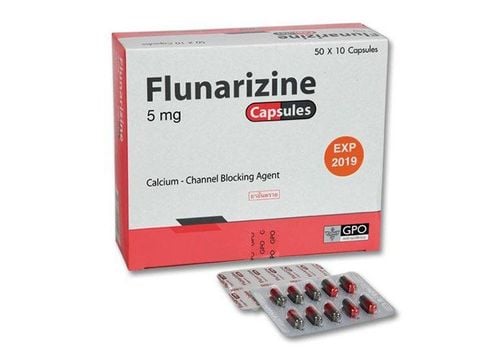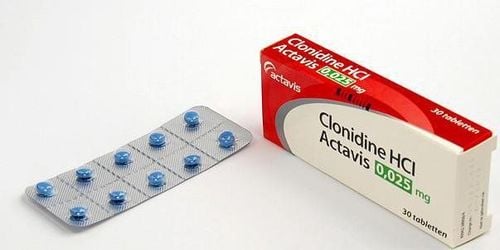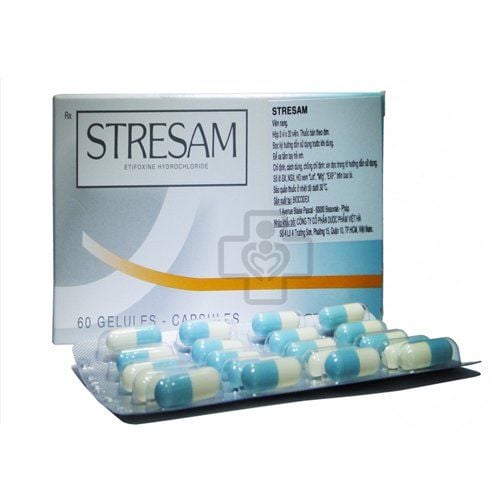This is an automatically translated article.
Acetaminophen is a pain reliever and fever reducer. Butalbital is in a group of drugs called barbiturates. Acetaminophen and Butalbital work to relax the muscle spasms associated with tension headaches.
1. What is Acetaminophen and Butalbital?
Acetaminophen and Butalbital is a combination medicine used to treat tension headaches caused by muscle contractions.
Acetaminophen and Butalbital may also be used for purposes not listed in this medication guide.
Acetaminophen and Butalbital drug forms can be encountered as follows:
Capsule form: Butalbital 50mg, Acetaminophen 300mg and Caffeine 40mg; Tablet form: Butalbital 50mg, Acetaminophen 325mg, Caffeine 40mg or Butalbital 50mg, Acetaminophen 325mg or Butalbital 50mg, Acetaminophen 300mg.
2. Important information when taking Acetaminophen and Butalbital
You should not use Acetaminophen and Butalbital if you have recently used alcohol, sedatives or other addictive drugs; Do not use Acetaminophen and Butalbital if you have taken an MAO inhibitor such as Isocarboxazid, Linezolid, Phenelzine in the past 14 days; Do not take more Acetaminophen and Butalbital than recommended. An overdose of Acetaminophen and Butalbital can damage your liver or cause death; You should contact your doctor right away if you have nausea, upper abdominal pain, itching, loss of appetite, dark urine, clay-colored stools, or yellowing of your skin or eyes; In rare cases, Acetaminophen can cause serious skin reactions; Stop using Acetaminophen and Butalbital and call your doctor at once if you develop skin redness or a widespread rash that causes blistering and peeling of the skin. 3. Notes before using Acetaminophen and Butalbital You should not use Acetaminophen and Butalbital if you are allergic to its ingredients, if you have porphyria or have recently used alcohol, sedatives or other drugs. other narcotic drugs.
To make sure Acetaminophen and Butalbital is safe for you, tell your doctor if:
Have liver disease, cirrhosis, a history of alcohol and drug abuse, or if you drink more than 3 types of alcohol alcohol every day; Kidney disease; Asthma , sleep apnea or other breathing disorders; stomach ulcers or bleeding; History of skin rash caused by any medication; History of mental illness or suicidal thoughts; If you use medicine to prevent blood clots from forming. Currently, there are no studies that prove the effects of Acetaminophen and Butalbital drugs will harm an unborn baby. If you use Acetaminophen and Butalbital while you are pregnant, your baby may become dependent on the medicine. This can cause life-threatening withdrawal signs in the baby after it is born. Babies born dependent on drugs are at risk of developing habits that may require medical treatment for several weeks. You should contact your treating doctor if you are pregnant or plan to become pregnant.
Acetaminophen and Butalbital can pass into breast milk and harm the baby. Contact your doctor if you are breast-feeding.
4. How should you use Acetaminophen and Butalbital?
Follow all instructions on the medicine label; Do not take more Acetaminophen and Butalbital than recommended; An overdose of Acetaminophen and Butalbital can damage your liver or cause death. Contact your treating doctor if the medication seems to stop working or relieve pain; The drugs Acetaminophen and Butalbital are potentially addictive; You should never share Acetaminophen and Butalbital with others, especially someone with a history of drug abuse or addiction; Store medicines out of reach of children and family pets; Take the medicine with food or milk if it upsets your stomach; Store Acetaminophen and Butalbital at room temperature away from moisture and heat; Keep track of the amount of Acetaminophen and Butalbital used from each new bottle. 5. What should be avoided when using Acetaminophen and Butalbital? This medicine may cause the side effect of reducing your thinking or reactions. You need to pay attention if you drive or do anything that requires alertness and alertness; Avoid alcohol while using Acetaminophen and Butalbital, because the drug can increase the risk of liver damage while using Acetaminophen; Ask your treating physician or clinical pharmacist before using any other cold, allergy, pain or sleeping medication. Acetaminophen (sometimes abbreviated as APAP) is an ingredient in many combination medicines. Taking certain products together can cause you to get too much Acetaminophen and lead to a fatal overdose. Be sure to check the label to see if the medication contains Acetaminophen or APAP; While you are using Acetaminophen and Butalbital, avoid taking weight loss pills, caffeine pills, or other stimulants (such as ADHD medications) without your doctor's advice.
6. How to use, dosage of Acetaminophen and Butalbital
6.1. Dosage of Acetaminophen and Butalbital
Dosage for adults with headache:
Butalbital 50mg / Acetaminophen 300mg / Caffeine 40 mg: 1 or 2 tablets taken every 4 hours as needed, not to exceed 6 tablets per day. Butalbital 50mg / Acetaminophen 325mg / Caffeine 40mg: 1 or 2 capsules orally every 4 hours as needed not to exceed 6 capsules or tablets per day. Butalbital 50mg / Acetaminophen 325 mg / Caffeine per 15ml oral liquid: 15 to 30 ml orally every 4 hours as needed not to exceed 90 ml per day. Therapeutic dose for children with headache:
Butalbital 50mg / acetaminophen 300mg / caffeine 40mg: 1 or 2 tablets every 4 hours as needed not to exceed 6 tablets per day; Butalbital 50mg / acetaminophen 325 mg / caffeine 40mg: 1 or 2 tablets or tablets every 4 hours as needed not to exceed 6 tablets or capsules per day; Butalbital 50 mg/acetaminophen 325 mg/caffeine per 15 ml oral liquid: 15 to 30 ml orally every 4 hours as needed not to exceed 90 ml per day.
6.2. Cases of overdose and toxicity
After an acute overdose of Acetaminophen and Butalbital combination tablets, toxicity may be caused by Barbiturates or Acetaminophen. Toxicity due to caffeine is less likely, due to the relatively small amounts in this formulation; Toxicity caused by barbiturate poisoning includes somnolence, confusion and coma, respiratory failure, low blood pressure and hypovolemic shock; Acetaminophen overdose: Liver necrosis, which can be fatal, is dose-dependent and is the most serious side effect. Other side effects such as tubular necrosis, hypoglycemic coma, and thrombocytopenia may also occur. Initial clinical symptoms following a potentially hepatotoxic overdose may include nausea, vomiting, convulsions, and malaise. Symptoms of hepatotoxicity may not be apparent until 48 to 72 hours after taking the drug; Acute caffeine poisoning can cause insomnia, restlessness, tremors and delirium, tachycardia, and extrasystoles. 6.3. Treatment of drug overdose Immediate emergency treatment includes supporting cardiovascular function and measures to reduce drug absorption; You should use oxygen, intravenous fluids, vasopressors and other supportive measures as indicated. Controlled or assisted ventilation may be used; Use activated charcoal before using N-acetylcysteine (NAC) to reduce systemic absorption if Acetaminophen is known or suspected within the previous few hours; Serum Acetaminophen should be measured immediately to assess the potential risk of hepatotoxicity if the user has been intoxicated for more than 4 hours. The treating doctor will intervene actively supportive therapy in case of severe poisoning; Measures to limit absorption must be taken promptly because liver damage is dose-dependent and occurs early in the course of toxicity. 6.4. Missed dose and what to do If you use Acetaminophen and Butalbital regularly, take the missed dose as soon as you remember; You should skip the missed dose of Acetaminophen and Butalbital if it is almost time for your next dose. Do not take 2 doses of the drug at the same time; You can take this medication as many times as needed, but do not exceed your doctor's prescription. 7. Acetaminophen and Butalbital side effects You should get emergency medical help if you have signs of an allergic reaction: hives ; shortness of breath; swelling of your face, lips, tongue, or throat.
In rare cases, Acetaminophen can cause a serious, fatal skin reaction. This can happen even if you have used Acetaminophen in the past and have not had a reaction. You need to stop using Acetaminophen and Butalbital and call your doctor right away if you have red skin or a rash that spreads and causes blistering or peeling. If you have this type of reaction, you should not take any medicine that contains the active ingredient Acetaminophen.
Stop using Acetaminophen and Butalbital and call your doctor at once if you have:
Confusion, seizure (convulsions); Shortness of breath ; Light-headed feeling like you might pass out; Nausea, epigastric pain, itching, loss of appetite, dark urine, clay-colored stools, jaundice or yellow eyes. Common undesirable effects may include:
Drowsiness, dizziness; Feeling anxious or restless; Feeling intoxicated; Sleep problems (insomnia). This is not a complete list of side effects and they can happen to everyone who uses them. You need to contact your doctor for medical advice about possible side effects when using the drug.
8. Acetaminophen and Butalbital Drug Interactions Taking Acetaminophen and Butalbital with other drugs makes you drowsy or slows your breathing, causing dangerous or life-threatening side effects. Ask your doctor before using Acetaminophen and Butalbital with a sleeping pill, narcotic pain medicine, muscle relaxer, or medicine for anxiety, depression, or seizures; Other drugs that may interact with Acetaminophen and Butalbital include prescription and over-the-counter medicines, vitamins, and herbal products; You need to tell each of your healthcare providers about all the medicines you use now and any medicines you start or stop using. Some extra notes:
Butalbital is potentially addictive and can be abused. Therefore, the long-term use of the drug is not recommended; Acetaminophen has been implicated in cases of acute liver failure, sometimes leading to liver transplantation and death; The risk of acute liver failure is higher in people with underlying liver disease and in those who drink alcohol during treatment with Acetaminophen; Acetaminophen rarely causes serious but potentially fatal skin reactions. You will be warned about signs of a serious skin reaction, and should stop using the medicine at the first sign of rash, skin rash or any other signs of hypersensitivity; People using the drug should stop using it immediately and seek medical attention if they experience signs of anaphylaxis; Do not prescribe Acetaminophen and Butalbital combination tablets for people who are allergic to Acetaminophen; Acetaminophen and Butalbital combination tablets should be prescribed with caution to certain people at special risk, such as the elderly or debilitated, severely impaired kidney or liver function, acute abdominal diseases; For pregnant women: There is no information on whether Acetaminophen and Butalbital combination tablets can harm an unborn baby when administered to a pregnant woman or may affect fertility. Therefore, the drug should only be used for pregnant women when absolutely necessary; Lactation: Acetaminophen and Butalbital are likely to be excreted in breast milk in small amounts, but their effect on the nursing infant is unknown. You should stop breastfeeding or discontinue use of the drug depending on the therapeutic benefit of the drug to the mother. For people who frequently drive and operate machines: Acetaminophen and Butalbital may impair mental and physical abilities when performing potentially hazardous tasks such as driving or operating machinery. Therefore, you should avoid using the drug while driving and operating machinery.
Please dial HOTLINE for more information or register for an appointment HERE. Download MyVinmec app to make appointments faster and to manage your bookings easily.













